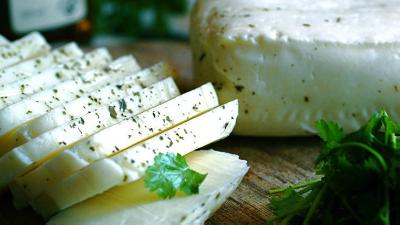Producers of the traditional Cypriot cheese halloumi saw a reduction in the growth of their exports, with cancellation of orders and undelivered quantities, due to the new restrictive measures for COVID-19 in most European countries.
The upward trend in halloumi exports which has been steady for the last fifteen years, began to decline for the first time in 2020, especially after October 2020, when new restrictive measures in many European countries were imposed and especially with the closure of restaurants.
Cheesemakers` Association President George Petrou told CNA, that exports were mainly affected in the last three months with orders being cancelled and a decrease in demand, resulting in around 7,000 tons of stock to remain undelivered, out of 35,000 tons that they export in total. He also noted that in the previous lockdown in March, demand had not been affected that much, as there were more sales in the supermarkets and restaurants in Europe were not completely closed.
“While there was a 20-25% increase yearly in the last 15 years, we have already fallen to a 10% increase until October and by the end of the year, exports are expected to remain at the same levels as last year,” said Petrou.
Based on last year’s forecast for demand, the cheesemakers had signed contracts with producers for increased quantities of cow milk, which as Petrou said, is expected to remain unconsumed. Additionally, he said, the Ministry of Trade as from January increased the quota of goat milk to be used in halloumi from 20% to 25%, which reduces even more the quantities of cow milk needed.
At the same time Petrou expressed concern on the developments after Brexit and and the possibility of a direct trade agreement between the UK and the Turkish occupied areas of Cyprus. So far, the Turkish Cypriots living there could not export directly to the UK under the EU rules.
In case of a direct trade agreement, Petrou said, British importers could buy cheaper halloumi from the Turkish Cypriots, who are not obliged to follow the same rules and controls in force in the areas controlled by the Republic, which is a full EU member-state.
The concerns of cheese makers increased after Thursday’s meeting of the Turkish Cypriot leader Ersin Tatar with the British Foreign Secretary Dominic Raab, in which the issue of direct trade with the puppet state in Cyprus’ north was raised.
Cyprus has been divided since 1974, when Turkey invaded and occupied its northern third. The latest UN backed round of talks took place in the Swiss resort of Crans Montana but failed to yield any results.













